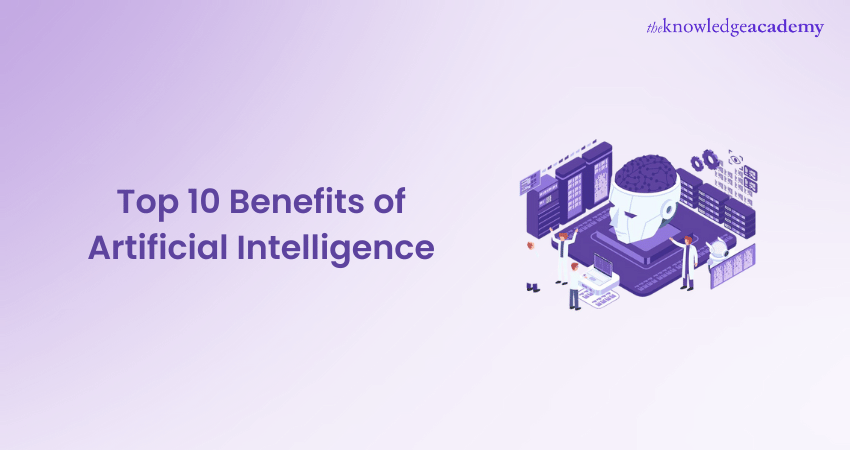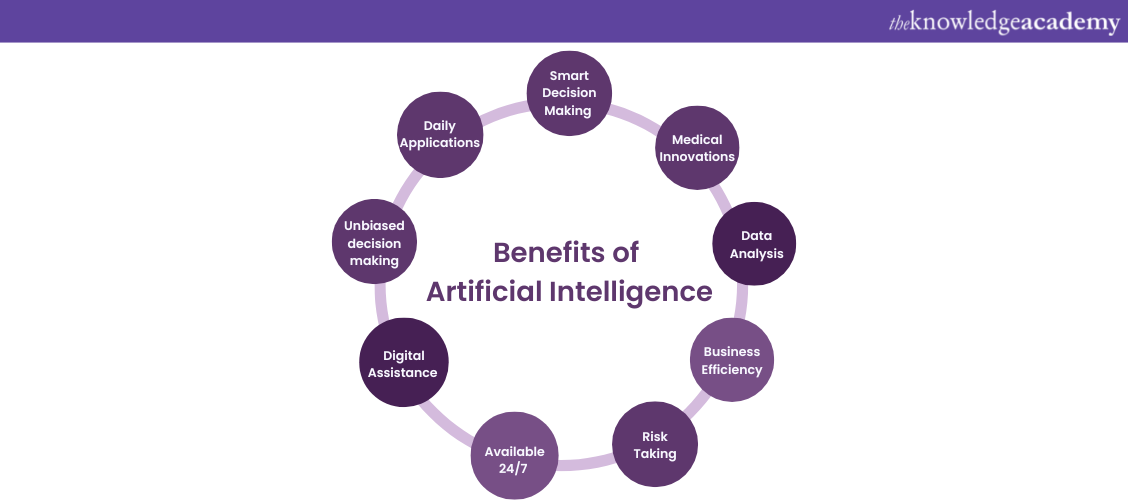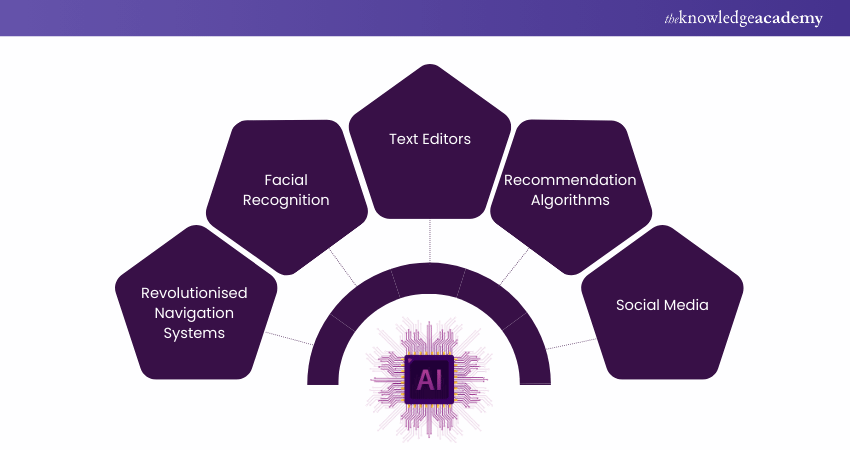We may not have the course you’re looking for. If you enquire or give us a call on + 1-866 272 8822 and speak to our training experts, we may still be able to help with your training requirements.
Training Outcomes Within Your Budget!
We ensure quality, budget-alignment, and timely delivery by our expert instructors.

Artificial Intelligence (AI) is a concept which has been a fly in everyone’s ears for quite some time now. Be it the quick suggestions on search engines like Google or Bing, or even the Chatbot, or the auto-focus in the smartphone camera application. The Benefits of Artificial Intelligence arose as an idea associated with robots and has now permeated every process available online. It hasn’t spared even email in the form of auto-completions. Read through this blog to learn different advantages of Artificial Intelligence.
Table of Contents
1) Benefits of Artificial Intelligence
a) Smart Decision Making
b) Medical Innovations
c) Data Analysis
d) Business Efficiency
e) Risk Taking
f) Available 24/7
g) Digital Assistance
h) Unbiased decision making
i) Daily Applications
J) Solving Complex Problems
2) Advantages and Disadvantages of Artificial Intelligence
3) Conclusion
Benefits of Artificial Intelligence
Artificial Intelligence boasts a diverse array of impactful uses, which we will explore in the following list. The advantages of Artificial Intelligence are manifold, offering solutions that enhance productivity, drive innovation, and provide unprecedented insights across various sectors. From automating mundane tasks to enabling complex Data Analysis, AI’s benefits are reshaping the way we live and work.

Smart Decision Making
Artificial Intelligence has been utilised in business for a very long time now. This means that it has led to an increase in efficiency and smartness in business decisions. AI has been programmed to perform a diverse range of tasks, including data delivery coordination, maintaining data consistency and providing forecasts for companies. AI has been made capable of even quantifying any uncertainties to boost decision-making for a company.
The distinction between AI and human beings is human emotion. Probably the biggest line is drawn between AI and humans. Humans possess both logical reasoning abilities and emotional intelligence, which are in varying balance across all human beings. It is capable of detecting variance at granular levels, which would be rather baffling to the perception of humans.
Medical Innovations
One of the booming sectors for AI applications is the Medical or Healthcare industry. The implementations of AI in the Medical domain have proven to cross the boundaries of human expectation and even imagination. For example, Remote patient monitoring technology enables healthcare providers to carry out clinical diagnoses followed by suggested treatment procedures.
This process does not require the patient's presence at the hospital. Additionally, the benefits of AI have also permeated to monitoring contagious diseases and predicting their future effects. The leverage of AI in healthcare leads to the deployment of precise and efficient innovations designed to care for patients who suffer from these diseases, hopefully also finding a cure for them.
Gain practical skills in machine learning and big data technologies with our Advanced Data Analytics Course – Register now!
Data Analysis
Data analysis methods and techniques have evolved considerably over the years, and the involvement of AI and Machine Learning technology has sent efficiency skyrocketing. To go into detail, AI is designed to generate predictive models and algorithms to execute the data. After which, the AI proceeds to understand the possible outcomes of various scenarios.
With AI's involvement in the data industry, automation is carried out on the work which would generally be performed by a human Data Analyst. The impression may come across as the Data Analyst being replaced by AI. However, AI's existence is meant to improve Data Analysts' abilities. These improvements involve increased speed, the scale of the data being analysed, and the data's granularity which is monitored.
Business Efficiency
Since the advent of AI, companies have pounced at the opportunity to evolve their business forecasting efficiencies, where critical decisions are made more promptly and prepared with a contingency plan in the case of any emergency. Furthermore, risk management typically relies on Data Analysis and Management. Using AI-supported tools would aid companies in their risk management processes and respective outcomes in the case of crises.
What's more, integrating AI with Machine Learning can generate scenarios to guide businesses in planning a strategy for rapid disaster recovery. data analysis generally generates observations of the audience or the economic trends that may impact marketing efforts. This is followed by tailor-made messages being scheduled at the right times without any involvement or intervention from the marketing team.
Risk taking
This can probably be counted as one of the prime Benefits of Artificial Intelligence. Risk is a term that describes any situation potentially exposing someone or something to danger. Moreover, humans are generally prone to taking risks followed by either successful outcomes or errors. Inadvertently, emotions also come into play during decision-making for humans.
At this point, AI takes over by significantly decreasing errors and increasing precision. This is because every instance of a decision made in AI is based on information gathered previously and a particular set of algorithms. Since its humans who design AI. So once programmed precisely, even the errors can potentially reduce to null.
Available 24/7
This benefit would be quite the no-brainer. It implies the precedence of AI over humans regarding productivity over long periods. Even the adjective 'long' is a massive understatement for AI's so-called 'stamina'. Artificial Intelligence can operate endlessly, as it is designed as a machine to run as long as it is programmed to do so. It learns non-stop based on a model which trains input and produces the respective outputs.
AI can, without a doubt, think much faster than human beings and carry out many tasks simultaneously with high-accuracy results. This implies that AI can work tirelessly around the clock at even repetitive jobs as long as AI algorithms support them.
Digital Assistance
Using Artificial Intelligence, scientists and designers came up with a technology called a 'Chatbot'. More precisely, a 'predictive chatbot' is an advanced computer application simulating a conversation with the people interacting with it. Digital assistants generally utilise NLP and Natural Language Understanding (NLU) to learn a human language on the go and offer a human-like conversational experience.
These chatbots are supported by algorithms that process the incoming data in the form of purchase preferences, home possession, family size and location. After this, data models are generated to recognise behaviour patterns and the refinement of patterns is carried out as the data is added with each conversation.
Unbiased decision making
Concerning the 5th benefit described earlier in this blog, Artificial Intelligence technology is void of emotions and very rational in its approaches to decision-making. These reasons contribute to precise and accurate outcomes from decisions because they are not interfered with by biased views or emotions. Now a counter to this apparent strength of AI in decision-making is that if humans program AI, can it also be biased?
Two types of biases exist in AI, namely 'data bias' or 'algorithmic bias', and 'societal bias'. The former involves algorithms trained with biased data, and the latter involves data containing societal assumptions and norms. These assumptions and norms arise from humans having certain blind spots or even particular expectations in our thought processes.
Daily Applications
Reading until this point in the blog, you have been introduced to the complex and large-scale applications of Artificial Intelligence. There also exist regular applications commonly well-known to most users of technology.
A few notable examples include:

1) Revolutionised navigation systems: Predictive traffic conditions and immersive city view, like in Google Maps.
2) Facial Recognition: Virtual facial filters in the camera and facial detection to unlock phones.
3) Text Editors: Use of NLP to recognise improper language and suggestions for corrections. AI editors are designed through the collaborative effort between linguists and computer scientists teaching them grammar.
4) Recommendation Algorithms: Learned behaviour by online services supported by smart systems and tracked online user activity. This is followed by data collection, storage and analysis using machine and deep learning techniques.
5) Social Media: Social Media applications designed with AI monitor content and provide advertisements to targeted end-users to ensure they remain invested and plugged in 'online' regularly.
Master your concepts in the applications of Artificial Intelligence by creating your own algorithms. Sign up for the Machine Learning Training course now!
Solving Complex Problems
AI technology, starting from simple Machine Learning to advanced Deep Learning, has made it capable of solving complex problems. AI helps many businesses in multiple industries with various tasks.
It includes fraud detection, personalised customer interactions, weather forecasting, medical diagnosis, etc. This technology allows companies to address their challenges more effectively. It leads to higher productivity and lower costs.
Conclusion
So far, until this point, you have been briefly introduced to Benefits of Artificial Intelligence. You may have realised how deeply technology has permeated nearly every aspect of your digital life, and this can come across as both a boon and a bane. The boon here would be AI supplementing human capabilities in the long term. The bane would be humans smartly figuring out a workaround for being employed and relevant in any industry.
Learn to apply industry-relevant knowledge in Machine Learning and Artificial Intelligence with our AI Course – sign up today!
Frequently Asked Questions

AI technology significantly impacts businesses. These impacts include data analysis, improved customer engagement, automation of organisational functions, strategic recommendations, and better decision making

There are many AI applications in everyday life. These include – virtual assistants, recommendation systems, social media algorithm, and AI-powered healthcare diagnostics.

The Knowledge Academy takes global learning to new heights, offering over 30,000 online courses across 490+ locations in 220 countries. This expansive reach ensures accessibility and convenience for learners worldwide.
Alongside our diverse Online Course Catalogue, encompassing 17 major categories, we go the extra mile by providing a plethora of free educational Online Resources like News updates, Blogs, videos, webinars, and interview questions. Tailoring learning experiences further, professionals can maximise value with customisable Course Bundles of TKA.

The Knowledge Academy’s Knowledge Pass, a prepaid voucher, adds another layer of flexibility, allowing course bookings over a 12-month period. Join us on a journey where education knows no bounds.

The Knowledge Academy offers various Data Analytics and AI Courses, including Advanced Data Analytics Courses, Alexa Course, and Apache Maven Training. These courses cater to different skill levels, providing comprehensive insights into Generative AI.
Our Data Analytics & AI Blogs cover a range of topics related to Artificial Intelligence, offering valuable resources, best practices, and industry insights. Whether you are a beginner or looking to advance your Data Analytical skills, The Knowledge Academy's diverse courses and informative blogs have got you covered
Upcoming Data, Analytics & AI Resources Batches & Dates
Date
 Introduction to AI Course
Introduction to AI Course
Fri 17th Jan 2025
Fri 7th Mar 2025
Fri 23rd May 2025
Fri 18th Jul 2025
Fri 12th Sep 2025
Fri 14th Nov 2025
Fri 12th Dec 2025







 Top Rated Course
Top Rated Course



 If you wish to make any changes to your course, please
If you wish to make any changes to your course, please


